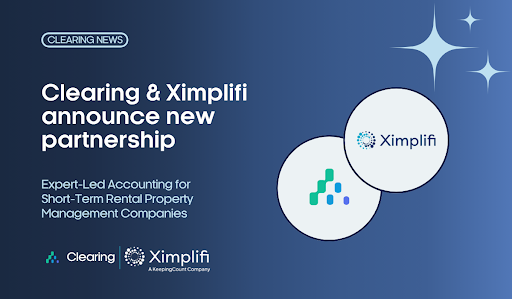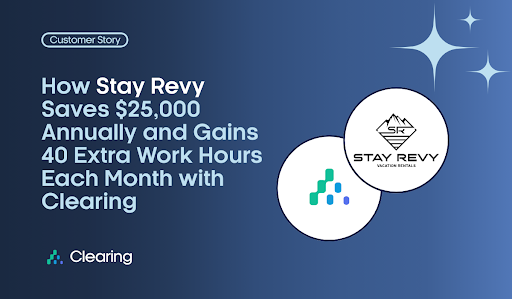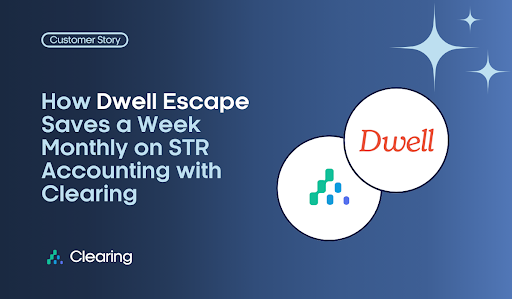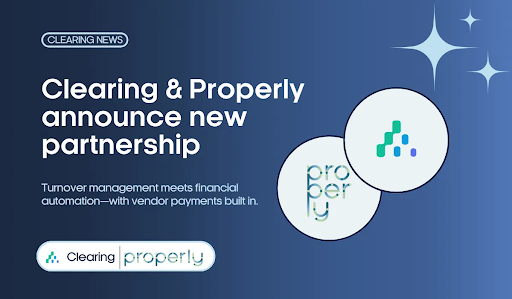Short-Term Rental Bookkeeping Best Practices
Find the best vacation rental accounting software tools for 2024 on our blog. Elevate your property management with these top solutions.
June 28, 2024
Michelle

Key Highlights
- Good bookkeeping practices are essential for the financial health and success of a Short-Term Rental business.
- Choosing the right accounting software tailored for Short-Term Rentals can streamline bookkeeping processes.
- Implementing separate bank accounts for business transactions ensures clear financial tracking and organization.
- Automating expense tracking saves time and reduces the risk of errors in bookkeeping.
- Establishing a consistent schedule for financial review and reconciliation helps keep records accurate and up to date.
- Understanding and utilizing key financial reports can provide valuable insights for decision-making and improving the financial health of the business.
Beyond Bookings: Why Bookkeeping is the Secret Weapon of Successful Short-Term Rentals?
While bookings and welcoming guests are certainly the heart of Short-Term Rental business, bookkeeping goes beyond hospitality. Effective bookkeeping is the foundation for building and scaling a successful Short-Term Rental business. It empowers you to make informed decisions, operate efficiently, and unlock opportunities for growth and profitability. It's the invisible force behind a thriving Short-Term Rental empire.
Bookkeeping Best Practices for Short-Term Rental Success
To ensure the success of your Short-Term Rental business, it is important to follow essential bookkeeping practices. These practices include using the right accounting software tailored for Short-Term Rentals, implementing separate bank accounts for business transactions, automating expense tracking, establishing a consistent schedule for financial review and reconciliation, and understanding and utilizing key financial reports. Here's where smart bookkeeping comes in:
1. Choose the Right Accounting Software Tailored for Short-Term Rentals
Choosing the right accounting software tailored for Short-Term Rentals is crucial for efficient bookkeeping. Look for software that is specifically designed for the unique needs of the Short-Term Rental industry. These software solutions often have features such as automated income tracking, expense categorization, and integration with popular booking platforms. By using the right accounting software, you can streamline your bookkeeping processes, save time, and have a more effective accounting system in place. Research different options, read reviews, and consider your specific needs to make an informed choice.
2. Implement a Separate Bank Account for Business Transactions

Implementing a separate bank account for your Short-Term Rental business transactions is essential for clear financial tracking and organization. Here are some key benefits of having a separate bank account:
- Clear separation: Separating personal and business finances ensures that you can easily identify and track your business expenses and income. Design an effective bank account structure according to your needs such as: some text
- Trust account to manage deposits from payment processors and Online Travel Agencies (OTAs)
- Operational account for bills and everyday spending
- Savings account for your long-term goals
- Emergency account to cover unexpected events. This will give you confidence knowing you have a financial buffer.
- Accurate bookkeeping: Having dedicated bank accounts keeps all your rental income and expenses neatly organized, saving you significant time and frustration when reconciling accounts or preparing taxes.
- Simplified tax filing: Separating finances makes identifying tax-deductible expenses, such as repairs, property taxes, or cleaning fees, a breeze. No more scrambling to categorize mixed transactions or missing out on tax deductions you deserve.
- Professional image: Having dedicated business accounts and trust accounts is a financial window into your Short-Term Rental operation. You can easily track rental income, analyze ongoing expenses, and assess profitability. A professional image instills confidence in lenders, investors, and customers.
3. Take Advantage of Clearing’s Expense Management and Zero-Balance Bank Accounts
Using a financial management app with expense management features designed for Short-Term Rentals, like Clearing, is a time-saving and error-reducing practice that greatly benefits your Short-Term Rental business.
Here’s what you will unlock with Clearing regarding expense management:
- Simplified capturing receipts: Instead of manual data entry, capture the receipts digitally through an app with its parsing capability to record the necessary information.
- Set rules for categorization: Customize categorization to organize your bookkeeping transactions.
- Allocate Expenses: Empower users to split transactions and allocate amounts to specific properties.
- Streamline expense management with Zero-Balance Accounts (ZBAs): ZBAs, also called sweep accounts, put all your expenses in one place, making them a breeze to manage from a categorization perspective. No more juggling spreadsheets or spending hours reconciling. Plus, the account automatically balances everything for you, so you can say goodbye to worrying about mistakes. They are used to allocate properties and homeowners to any transactions made through them.
4. Establish a Consistent Schedule for Financial Review and Reconciliation
Establishing a consistent schedule for financial review and reconciliation is crucial for maintaining accurate records and ensuring the financial health of your Short-Term Rental business. Here are some key reasons why this practice is important:
- Identify discrepancies: Keeping your finances organized doesn't have to be a chore. Streamline the process by reconciling both trust and operating accounts linked to Clearing all in one place. This means you can catch and fix any errors quickly, ensuring your financial records are always accurate and up-to-date.
- Monitor cash flow: By reviewing your financial records regularly, you can monitor your cash flow and identify any potential issues or trends that require attention.
- Make informed decisions: Having up-to-date financial records enables you to make informed decisions about your business, such as budgeting, pricing, and investment opportunities.
- Stay compliant: Regular financial review and reconciliation help ensure that your business is compliant with accounting standards and requirements.
5. Understand and Utilize Key Financial Reports for Decision Making
Understanding and utilizing key financial reports is essential for making informed decisions about your Short-Term Rental business. Here are some important financial reports to consider:
- Owner Statement: This provides an overview of the financial performance of a property owned by someone else, that you manage, it includes details like:: some text
- Rental income from guests.
- Expenses associated with running their rentals such as maintenance costs, cleaning services, utilities, supplies, and repairs.
- Profit over a specific period. It essentially shows you how much money you owe your owner each month.
- Management statement: This focuses on the operational performance of the business and includes a summary of the revenues, expenses, commissions, and markups brought to the management company, from a specific owner’s property, or from all properties at once.
- Profit and Loss: The profit & loss statement summarizes the financial performance by detailing revenue generated from rentals, minus expenses such as property maintenance, utilities, marketing, and management fees, resulting in the net profit or loss for a specific period.
- Reconciliation Report: This ensures payouts from bookings are accurately found in the bank account and reflected in your financial reports.
6. Develop a System for Managing Guest Payments and Deposits Efficiently

Developing a system for managing guest payments and deposits efficiently is essential for the financial management of your Short-Term Rental business. Consider the following tips:
- Clear payment policies: Clearly communicate your payment policies to guests, including deposit requirements, payment methods accepted, and due dates.
- Secure online payment processing: Utilize secure online payment processors to facilitate guest payments. This can help streamline the payment process and reduce the risk of cash-handling errors.
- Automated reminders: Implement automated reminders for guests to ensure timely payments and reduce the need for manual follow-ups.
- Record keeping: Maintain detailed records of guest payments, deposits, and refunds. This will help you track revenue streams, analyze financial performance, and handle any disputes or discrepancies.
7. Prioritize Accurate and Timely Tax Reporting and Compliance
Accurate and timely tax reporting and compliance are crucial for the financial health of your Short-Term Rental business. Here are some key considerations:
- Record-keeping: Maintain organized and detailed records of all income and expenses related to your Short-Term Rental business. This will make tax preparation easier and ensure accurate reporting.
- Tax deductions: Familiarize yourself with tax deductions and credits specific to the Short-Term Rental industry. Consult with a tax professional to maximize your deductions and minimize your tax liability.
- Compliance with accounting principles: Ensure that your financial records and reports adhere to accounting principles and standards. This will help avoid any potential penalties or legal issues.
8. Embrace Cloud-Based Bookkeeping for Accessibility

Embracing cloud-based bookkeeping can offer significant benefits to your Short-Term Rental business. Here's why you should consider it:
- Accessibility: Cloud-based bookkeeping software allows you to access your financial data from anywhere, anytime, as long as you have an internet connection. This flexibility is especially valuable for business owners who are constantly on the go.
- Collaboration: Cloud-based bookkeeping software enables easy collaboration with your bookkeeper, accountant, or other team members. You can share access to financial records and work together in real time.
- Security: Cloud-based bookkeeping solutions often come with enhanced security measures, such as data encryption and regular backups. This ensures the safety and protection of your financial data.
9. Engage in Proactive Cash Flow Management to Ensure Financial Health
Proactive cash flow management is vital for the financial health and success of your Short-Term Rental business. Consider the following practices:
- Monitor cash inflows and outflows: Regularly track and analyze your cash flow to identify patterns, anticipate future needs, and make informed financial decisions.
- Maintain a cash reserve: Set aside a portion of your rental income as a cash reserve to cover unexpected expenses or periods of low occupancy.
- Implement accrual accounting: Consider using accrual accounting to track revenue and expenses based on when they are earned or incurred, rather than when cash is received or paid. This provides a more accurate representation of your business's financial position.
- Optimize revenue streams: Continually explore ways to maximize your rental income through effective pricing strategies, marketing efforts, and guest satisfaction.
10. Consider Professional Bookkeeping Services for Complex Needs
It may be beneficial to consider professional bookkeeping services. Here's why:
- Expertise: Professional bookkeepers and certified public accountants (CPAs) have the knowledge and experience to handle complex accounting tasks and ensure compliance with accounting principles.
- Time-saving: Outsourcing your bookkeeping tasks allows you to focus on other aspects of your business, saving you time and energy.
- Accuracy: Professional bookkeepers have the expertise to maintain accurate financial records, reducing the risk of errors.
For complex accounting needs or if you have limited time to manage your bookkeeping, Clearing offers cutting-edge bookkeeping services through innovative partnerships with service providers.
Maximizing Your Rental Income Through Effective Bookkeeping
Effective bookkeeping practices can contribute to maximizing your rental income in the Short-Term Rental business. Good bookkeeping allows you to track rental income, manage expenses, and make informed decisions about pricing, marketing strategies, and guest satisfaction.
11. Analyze Performance Metrics to Identify Revenue Opportunities

Analyzing performance metrics is crucial for identifying revenue opportunities in your Short-Term Rental business. By tracking key performance indicators (KPIs) such as occupancy rates, average daily rates, and guest satisfaction scores, you can gain valuable insights into your business's performance. These insights can help you identify areas for improvement, adjust pricing strategies, target marketing efforts effectively, and optimize your revenue streams. Review and analyze performance metrics to make data-driven decisions that can lead to increased rental income and overall business success.
12. Regularly Update Rental Rates Based on Market Analysis
Regularly updating rental rates based on market analysis is one of the best practices for maximizing rental income in a Short-Term Rental business. Conducting market analysis allows you to stay informed about pricing trends, competition, and demand in your area. Dynamic pricing strategies, such as offering discounts during low-demand periods or increasing rates during high-demand periods, can help you capitalize on market conditions and maximize your rental income. Stay proactive in monitoring the market and be flexible in adjusting your rental rates to stay competitive and profitable.
13. Optimize Occupancy Rates Through Dynamic Pricing Strategies
Optimizing occupancy rates through dynamic pricing strategies is a key aspect of maximizing rental income in the Short-Term Rental business. Dynamic pricing involves adjusting rental rates based on factors such as demand, seasonality, and events in your area. Consider utilizing pricing software or a platform that can automatically adjust rental rates based on market conditions.
Navigating Common Bookkeeping Challenges for Short-Term Rentals
While bookkeeping is crucial for the success of a Short-Term Rental business, it can also present some challenges. Navigating these challenges is essential to ensure accurate financial records and effective bookkeeping practices. Common bookkeeping challenges for Short-Term Rentals may include managing cancellations and refunds, handling seasonal fluctuations in income and expenses, and securing financial records and sensitive guest information. By being aware of these challenges and implementing proactive strategies, you can overcome them and maintain strong bookkeeping practices for your Short-Term Rental business.
14. Handling Cancellations and Refunds with Minimal Financial Impact

Handling cancellations and refunds effectively is important to minimize the financial impact on your Short-Term Rental business. Here are some tips for navigating this challenge:
- Clear cancellation policies: Clearly communicate your cancellation policies to guests upfront to manage expectations and minimize cancellations.
- Refund policies: Establish refund policies that are fair to both guests and your business. Consider offering partial refunds for cancellations within a certain timeframe.
- Insurance coverage: Consider obtaining rental insurance that covers cancellations and refunds to protect your business from significant financial losses.
- Rebooking strategies: Develop strategies to rebook canceled bookings to minimize the impact on your revenue streams.
15. Dealing with Seasonal Fluctuations in Income and Expenses
Seasonal fluctuations in income and expenses can present a challenge for Short-Term Rental businesses. Here are some strategies to navigate this challenge:
- Budgeting: Develop a budget that accounts for seasonal variations in income and expenses. Plan ahead and set aside funds during high-demand periods to cover expenses during low-demand periods.
- Flexible pricing: Consider adjusting your rental rates based on seasonal demand to attract more guests during slower seasons.
- Diversify revenue streams: Explore additional revenue streams during slower seasons. For example, consider offering additional services or partnering with local attractions to generate income.
- Expense management: Review and adjust your expenses during slower seasons to minimize costs and maintain profitability.
16. Securing Financial Records and Sensitive Guest Information
Securing financial records and sensitive guest information is crucial for the protection of your Short-Term Rental business and the trust of your guests. Here are some steps to enhance data security:
- Data encryption: Use encryption technology to protect financial records and sensitive guest information from unauthorized access.
- Secure storage: Store financial records and guest information in secure and password-protected locations, both physically and digitally.
- Access controls: Limit access to financial records and sensitive guest information to authorized personnel only.
- Regular backups: Regularly back up financial records and guest information to protect against data loss or corruption.
- Compliance with data protection regulations: Stay up to date with data protection regulations and ensure that your business is compliant with applicable laws.
17. Dealing with OTA Payouts with Multiple Bookings

Matching OTA payouts to individual bookings can be a headache. Often, these payouts only show the total amount with minimal breakdown. This makes it nearly impossible to connect the payout to specific reservations in your accounting system. Clearing employs an automated system to meticulously allocate the disbursement received from the OTA. This allocation ensures each portion is precisely categorized, designated to the relevant property, and attributed to the appropriate owner.
Build a Strong Financial Foundation
In the realm of Short-Term Rental bookkeeping, success hinges on savvy financial practices. Implementing tailored STR accounting software, maintaining separate business accounts for each purpose (trust and operations), and embracing automation are pivotal steps. Regular financial reviews, strategic guest payment management, and proactive cash flow monitoring are also key players. By optimizing income through market analysis, dynamic pricing strategies, and effective rate adjustments, you can amplify your rental revenue.
Fortify your financial terrain. Learn more and become a bookkeeping pro!
Clearing is a Financial Technology Company, not a bank.


.png)
.png)
.png)

.png)

.png)


.png)
.png)
.png)
%20(1).png)
%20(1).png)
%20(1).png)
.png)
%20(2).png)
%20(1).png)
%20(1).png)
.png)

.png)
.png)
.png)
%20(1).png)
.png)
.png)
.png)
.png)
.png)
.png)
.png)
%20(1).png)
.png)
.png)
.png)
%20(1).png)
%20(1).png)
%20(1).png)







.jpg)
%20(1).png)
%20(1).png)
%20(2).png)
%20(1).png)

%20(1).png)
%20(1).png)
%20(1).png)



%20(1).png)
%20(1).png)
%20(1).png)
%20(1).png)
%20(1).png)


%20(1).png)
%20(1).png)
%20(1).png)
%20(2).png)
%20(2).png)



%20(2).png)


%20(2).png)
%20(1).png)
.png)


%20(2).png)
%20(2).png)

.jpg)
.png)
.png)
.png)



.png)

.png)
%20(1).png)
.png)

.png)